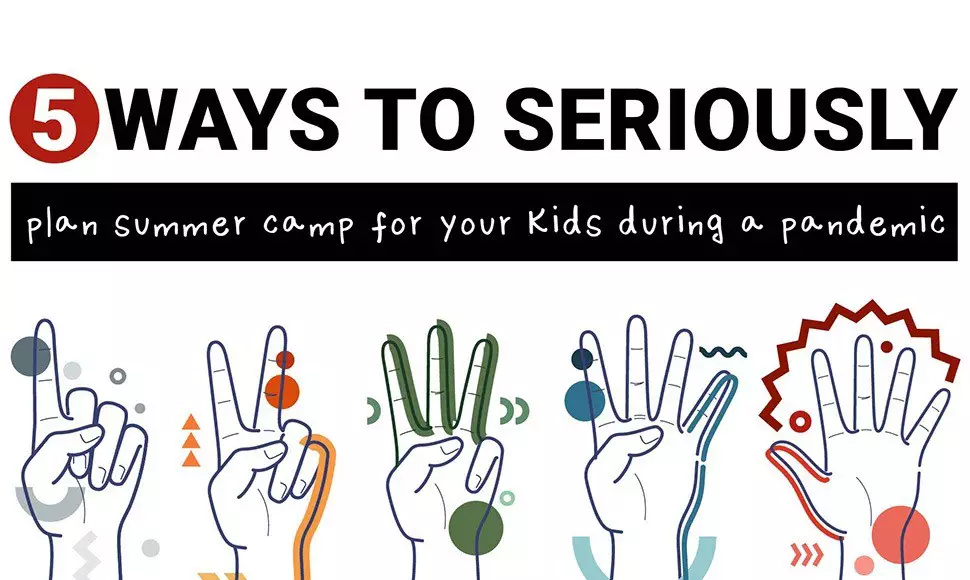Plan summer camp during a pandemic

Summer 2021 will definitely look different from summer 2020. With hundreds of millions of COVID-19 vaccinations currently under our collective belt (and a reasonable hope that a children’s vaccine will be available before the next school year), there’s a palpable relief in feeling like we can all do a little more this summer than sit at home.
And yet the pandemic isn’t exactly over. As parents contemplate summer with equal parts anticipation and dread, the question emerges: What summer camp options are possible during COVID?
The answer is complicated, says Pam Roggeman, EdD. Roggeman is the dean of the College of Education at University of Phoenix and a parent herself. She understands the real challenges that summer presents to parents who need reliable child care but also want to give their kids that summer vacation experience. Add to that the very real concerns around transportation, cost, and, yes, COVID, and it can feel easier to stick your head in the proverbial sand rather than figure out a summer camp action plan.
But making that plan is not only doable, it’s advisable, especially if you want your summer to progress smoothly. To start, outline some basic guidelines you're comfortable with in a camp. Do you want, for example, to see distancing? Small class sizes? Mandatory hand-washing? Get clear on what you need to feel comfortable with in terms of a risk threshold.
From there, Roggeman suggests exploring city websites for low-cost camps that hold broad appeal (think cupcake decorating). Other options include the YMCA, your local library and even your gym, all of which usually offer free or affordable options. Many organizations are even moving their programming outdoors, Roggeman adds, for COVID-friendly summer-camp options.
When you’re eyeing something more expensive (art studios, pottery painting), check out online discount options like Groupon for ways to get all the fun at a fraction of the cost.
So, what else should you keep in mind? Roggeman provides five ways to plan like a pro:
Customize the summer camp to your child.
"I think the most important thing to consider is your child," Roggeman says. Look at both what they like and what they need. Then, find the balance.
Did they suffer from the loss of socialization with remote learning? If so, consider getting a friend to sign up for the same camp. Do they need academic support to get caught up over the summer? Then check out math and writing camps. Do they love video games? Then maybe you need to balance that with a sports camp.
If you have more than one child, rinse and repeat. "What works for Child A," Roggeman says, "won’t necessarily work for Child B."
Use your child’s teacher as a resource.
Teachers have a unique perspective on kids that parents don’t always anticipate. As a result, they can sometimes identify strengths or weaknesses that might help guide parents toward the right summer camp.
Check in with your child’s teacher for recommendations on what might be a good fit. Or, if your child is older, ask a favorite teacher for ideas about what’s available. From online resources (hello, college-application essay writing!) to writing workshops, teachers can serve as ideal matchmakers between your child and available options.
Roggeman adds that some teachers even offer informal workshops and tutoring over the summer.
Consider your support system.
Connect with people around you to ask for what you need, says Roggeman.
For example, transportation doesn’t have to be the sole domain of parents. Grandparents, neighbors and even older kids can help drive kids to and from camps throughout the summer.
If you don’t have a large and reliable network, see if you and your partner can alternate schedules to cover driving obligations to and from summer camps while limiting COVID exposure. (This also works great for vacation time, with parents alternating time off to watch the kids between camps.)
Plan ahead.
"I used to not be comfortable if I didn’t have my summer schedule set before the school year was over," Roggeman recalls.
Her children are grown now, but figuring out who could drive them, who could be home to watch them and so on gave her the peace of mind she needed to face those three vacation months.
Not only does advance planning let parents relax, but it also means your child can get into the camps he or she prefers. Plus, you can get some perspective on how the whole summer looks when you plan ahead.
"It’s been a tough year," Roggeman concedes. "Kids didn’t have unstructured time to play with friends last summer, so maybe work in a day or two — or even a week or two — of unstructured time when you can have friends over and just play."
Consult your kids.
Even the best-laid plans can be improved. You may think you’ve discovered the perfect camp, but that doesn’t mean your kids will agree. Talk with your children about what you have planned. Help younger kids visualize what their days will look like at a given activity, and ask older kids for their input on which activities they’d like to try.
Also, consider volunteer opportunities for kids ages 11 and up, Roggeman adds. Churches, synagogues, libraries and schools can often use extra help. And teaching your kids the importance of pitching in may just be the most beneficial takeaway of all.
As with pretty much everything else in the world these days, COVID has changed the way summer camp will look this year. For those parents who still don’t feel comfortable signing up for a traditional summer camp experience, Roggeman suggests relying on your bubble.
If there are one or two families you’ve been seeing regularly, she says, consider arranging a rotation of activities at each other’s houses over the summer. Kids can wear masks and stay mostly outside to mitigate the possibility of infection. It gives everyone a chance to get creative. Picnics, cooking lessons, pool games and even turning holiday activities into summer ones (valentines become friendship cards, for example, and Easter eggs become summer egg hunts) are all ways to have fun and stay safe during the summer.
Beyond that, don’t lose sight of the fact that this is summer for you too.
"We parents need a summer as well," Roggeman points out.
Accordingly, make plans to take some time off even if you’re staying in town so that you can connect as a family. Early morning hikes, days in the pool, outdoor movie nights — these are the moments that often define a summer. Make sure you are part of them.
Looking for more at-home activities to entertain the kids? We’ve got you!
If you’re looking to make the most out of your summer, check out how University of Phoenix makes school convenient any time of year.


